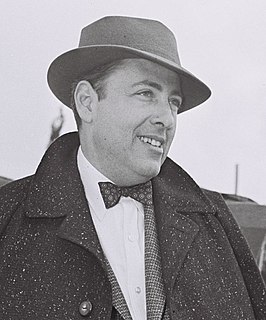A Quote by Lois McMaster Bujold
Any man can be kind when he is comfortable. I'd always thought kindness a trivial virtue, therefore. But when we were hungry, thirsty, sick, frightened, with our deaths shouting at us, in the heart of horror, you were still as unfailingly courteous as a gentleman at ease before his own hearth.
Related Quotes
He knew that we gave constant lip service to the dictates of safety and howled like Christians condemned to the arena if any compromise were made of it. He knew we were seekers after ease, suspicious, egotistic, and stubborn to a fault. He also knew that none of us would have continued our careers unless we had always been, and still were, helpless before this opportunity to take a chance.
Farmers everywhere provide bread for all humanity, but it is Christ alone who is the bread of life...Even if all the physical hunger of the world were satisfied, even if everyone who is hungry were fed by his or her own labor or by the generosity of others, the deepest hunger of man would still exist...Therefore, I say, Come, all of you, to Christ. He is the bread of life. Come to Christ and you will never be hungry again.
A man who is wrathful with us is a sick man; we must apply a plaster to his heart - love; we must treat him kindly, speak to him gently, lovingly. And if there is not deeply-rooted malice against us within him, but only a temporary fit of anger, you will see how his heart, or his malice, will melt away through your kindness and love - how good will conquer evil. A Christian must always be kind, gracious, and wise in order to conquer evil by good.
Let us fill a cup and drink to that most noble, ridiculous, laughable, sublime figure in our lives... The Young Man Who Was. Let us drink to his dreams, for they were rainbow-colored; to his appetites, for they were strong; to his blunders, for they were huge; to his pains for they were sharp; to his time for it was brief; and to his end, for it was to become one of us.
The impulse to confession almost always requires the presence of a fresh ear and a fresh heart; and in our moments of spiritual need, the man to whom we have no tie but our common nature, seems nearer to us than mother, brother, or friend. Our daily familiar life is but a hiding of ourselves from each other behind a screen of trivial words and deeds, and those who sit with us at the same hearth, are often the farthest off from the deep human soul within us, full of unspoken evil and unacted good.
Though our brother is upon the rack, as long as we ourselves are at ease, our senses will never inform us of what he suffers. They never did and never can carry us beyond our own persons, and it is by the imagination only that we form any conception of what are his sensations...His agonies, when they are thus brought home to ourselves, when we have this adopted and made them our own, begin at last to affect us, and we then tremble and shudder at the thought of what he feels.
...people get hurt in rumbles, maybe killed. I'm sick of it because it doesn't do any good. You can't win...even if you whip us. You'll still be where you were before- at the bottom. And we'll still be the lucky ones with all the breaks. So it doesn't do any good, the fighting and the killing. It doesn't prove a thing.
I thought I could capture the stories of the city on paper. I thought I could write about the horrors of the city. Horror stories you see. I tell you I didn't have to look far for material. Everywhere I looked, there were stories hidden there in the dark corners. . . . I wrote and still there were more. . . . No one would publish them. 'Too horrible,' they said. 'Sick mind,' they said. I thought I could write about the horrors of the city but the horror is too big and it goes on forever.
Yea, let them which have been redeemed of the Lord, shew how He hath delivered them from the hand of the oppressor. When they wandered in the desert wilderness out of the way, and found no city to dwell in, both hungry and thirsty, their soul was overwhelmed in them. Let them confess before the Lord His loving kindness and His wonderful works before the sons of men.






































